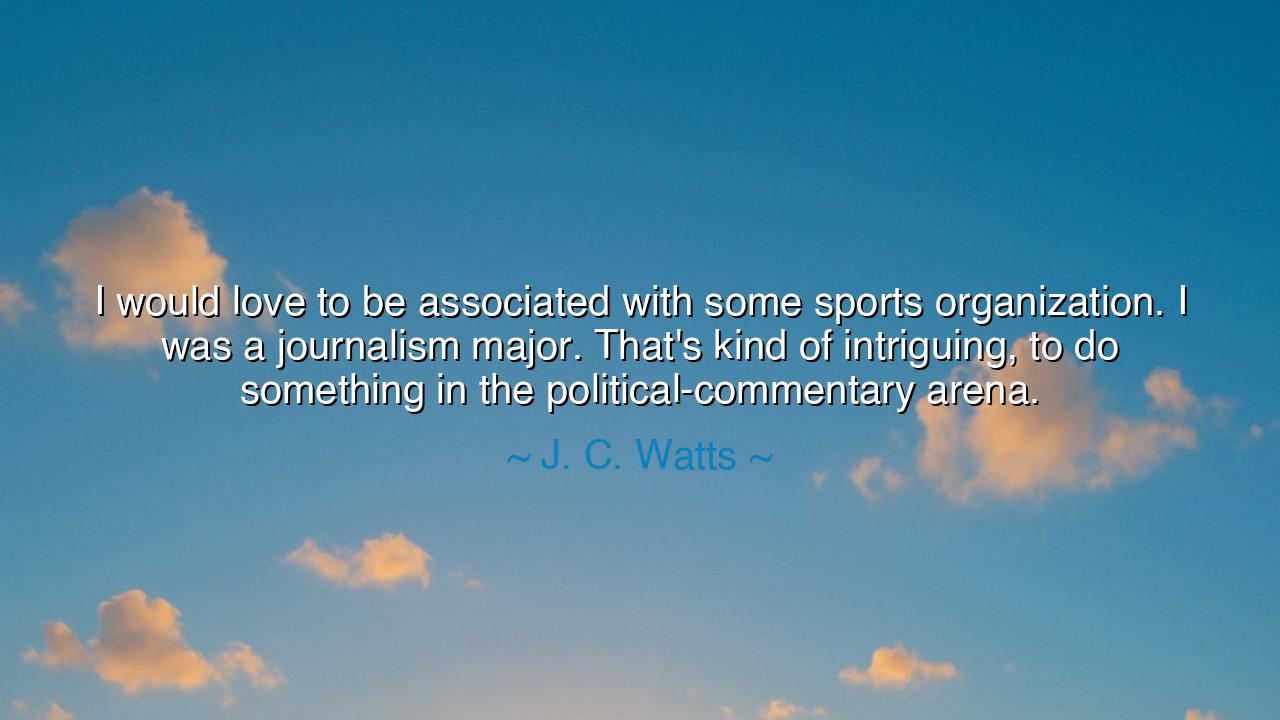
I would love to be associated with some sports organization. I
I would love to be associated with some sports organization. I was a journalism major. That's kind of intriguing, to do something in the political-commentary arena.






The statesman and athlete, J. C. Watts, once reflected on the intersection of his passions with these words: “I would love to be associated with some sports organization. I was a journalism major. That's kind of intriguing, to do something in the political-commentary arena.” At first glance, his statement is a simple expression of ambition, yet it carries a profound lesson on the blending of disciplines, the pursuit of curiosity, and the courage to forge paths that straddle worlds. Watts, trained both in the physical rigor of sport and the intellectual craft of journalism, recognizes that life’s richest opportunities often lie where our passions intersect.
This quote reveals the value of versatility and openness. Watts does not limit himself to one field—athletics or politics, reporting or analysis—but imagines a domain where all these skills converge. Herein lies the ancient wisdom: the greatest men and women were seldom confined to a single path. Leonardo da Vinci painted, engineered, studied anatomy, and designed machines; his brilliance emerged from curiosity and the courage to explore multiple realms. Similarly, Watts contemplates a life that is neither narrowly defined nor restricted, a life that embraces both the physical and the intellectual.
History shows that such intersections produce leaders of unique perspective. George Foreman, the boxer, later became a successful entrepreneur and commentator, translating the discipline of the ring into insight and persuasion in public life. By combining practical experience with the ability to communicate, he reached audiences far beyond the boxing arena. Watts’s vision echoes this model: to take the knowledge of one world and apply it in another, thereby amplifying both reach and impact.
The meaning of his words also speaks to the human need for intellectual curiosity. As a journalism major, Watts is drawn to the analysis and narration of events, yet he sees in sports an avenue to connect with people, to tell stories that resonate beyond the scoreboard. Political commentary, similarly, requires the capacity to observe, to synthesize, and to convey truth compellingly. His insight reminds us that the bridges between disciplines are often where innovation and influence thrive.
Watts’s contemplation also highlights the value of experience informing insight. One cannot truly comment on sports without having known the discipline, nor can one illuminate politics without understanding its structures and pressures. This dual knowledge—of action and observation—is what gives perspective its power. The great orators and commentators of history, from Demosthenes in Athens to modern journalists, have all balanced experience with reflection, showing that wisdom grows where practice meets thought.
The lesson for us is profound: cultivate both skill and reflection, experience and study. Do not confine your ambition to the known and the narrow. Explore where your interests converge, and let that convergence guide your path. Curiosity, courage, and the willingness to step into uncharted intersections can transform a career into a vocation, and a vocation into a force that shapes minds and hearts alike.
Thus, J. C. Watts’s quote is more than a personal musing—it is a call to action. It teaches that life’s most compelling paths are rarely linear, and that the fusion of disciplines can lead to influence, fulfillment, and creativity. Let us then honor our curiosities, explore their intersections, and allow the worlds we inhabit—be they sports, politics, or communication—to converge in ways that illuminate not only our own lives but the lives of those who witness our journey.






AAdministratorAdministrator
Welcome, honored guests. Please leave a comment, we will respond soon